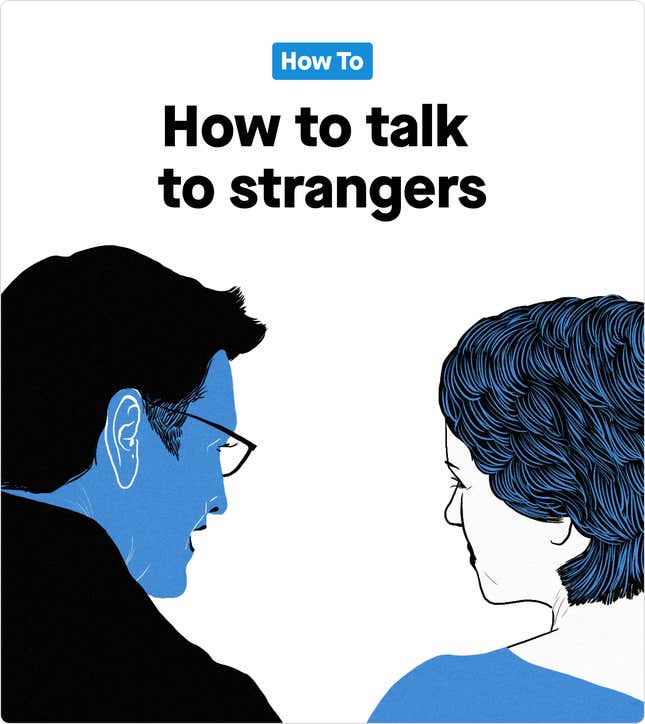
Hi Quartz members,
One near immediate effect of the pandemic was how quickly it limited our social circles. What fell away were our casual connections—work acquaintances, carpool buddies, friendly grocery store clerks. Most of us were meeting fewer people than ever.
While they might seem nonessential at first, those connections can be critical. They can be conduits for open conversations about our innermost lives. They can even come with cognitive benefits.
Even if we know these loose connections are important, how do we begin to tackle conversations with people we know less well when we’ve been out of practice? Whether you’re just emerging from quarantine or have been going back to the office for a year, here is what you need to know to break past the inhibitions that are holding you back from deeper connections with those peripheral relationships.
The importance of talking to strangers
Talking to strangers often means seeking out people who have cognitive empathy—who might be living in a situation similar to our own and so can understand it better than a best friend or family who may be more removed, says Mario Small, a Harvard sociologist who studies personal networks.
If a PhD student is struggling in their program, they’re more likely to turn to another PhD student; if a person’s dog is having behavioral problems that person is more likely to seek out another dog owner. Baristas may also share our tastes in coffee or fellow yoga class attendees may have the same goals for physical health.
How well these two people know each other matters less than the thing they’re connecting over. The shared experiences of recovering alcoholics is in part why many people feel free to share very personal and sometimes embarrassing parts of their lives to people they don’t know in alcoholics anonymous, Small says.
In fact, a little distance from our internal or everyday emotional lives can be an important part of these insightful conversations. If we talk to our parents about relationship problems, they may begin to act protective when in reality all we wanted was a confidante to listen without trying to fix the problem, Small adds. In other cases, people may have a complicated relationship with their parents or may not want their parents to judge them.
“People are very likely to avoid the people they are close to,” for at least some things, Small says.
You know what else is hard to talk about? Money. But it doesn’t have to be. Check out Quartz’s newest email course, the Fundamentals of personal finance. It’s not meant to be prescriptive or personalized, but hopefully you’ll walk away with some ideas about how to better manage your own finances, plus a little more confidence to boot. Sign up here, and invite your friends old and new.
The misconceptions holding us back
The ways interactions with strangers go in our heads versus how they go in real life are often not the same. Here are some common misconceptions that people have about talking to others.
The conversation will be awkward. This assumption often holds people back from meaningful conversations with strangers, according to a new study from the University of Chicago published in September 2021. It turns out that people enjoyed both small talk and meaningful conversations more than they thought they would—and the deeper conversations surpassed their expectations for the interaction even more than the small talk did. In a 2014 study also out of the University of Chicago, researchers found that even chats with strangers during a subway commute left people feeling happier.
People want to be left alone. Studies have shown that this is not the case—both the conversation starter and the other person most often end up feeling happier for having talked. As it turns out, humans actually get a boost in self confidence and overall well being when they strike up a conversation with someone they don’t know. Short-term boosts in happiness are another plus, but conversation starters can also get friends, romantic partners, and business contacts out of these encounters.
We’re afraid of getting hurt. It turns out that on average these deep conversations with lesser-known friends or strangers often go better than people originally assume, Smalls says. The basic need to empathize means that the listener is less likely to hurt the other person.
Talk the talk
You’re ready to get out there. Here’s how to start.
Be confident. Belgian psychotherapist Esther Perel’s guidelines for having deeper conversations include finding confidence to have conversations before you even leave the house. This can be as simple as listening to affirmations on YouTube, or writing down things that you’re good at or things that you like about yourself. If you don’t feel up to the task of building that confidence yourself, you could also ask a friend or family member to answer the questions for you.
Embrace small talk. Sometimes the easiest ways to enter into conversation with someone is starting with what’s right in front of you—your environment and even the weather are things you’re sharing with the other person. While small talk might seem like the antithesis to more meaningful conversations with new people, it can actually be a way of discovering whether or not the other person is capable of respecting boundaries, says psychotherapist Matthias Barker. For instance, if you make it clear that you don’t like The Office as a TV show and your conversation partners starts to quote it, it might indicate that the other person doesn’t have an awareness of you.
Listen actively. To make sure that small talk can be a productive time in which the opportunity for more meaningful conversations can arise, take into account Erich Fromm’s six rules for listening. First, concentrate on the listener—if you’re going to be able to find common ground with another person and learn where their boundaries are, you have to be paying full attention to their verbal and nonverbal communication instead of thinking about what you’re going to say next or what’s happening at home.
American radio journalist Celeste Headlee also suggests that adventurous conversationalists take a cue from the news business and ask open-ended questions that start with how, what, when, where, and why. Instead of telling your conversation partner how to feel about something (‘That must have been terrifying!’), these kinds of questions allow them to express their experiences in their own words (‘How did that make you feel?’). It sounds less like therapy after you take it for a test drive.
Have a great weekend,
—Nate DiCamillo, economics reporter (gets paid to talk to people)
One 🗣️ thing
Still feel like you need practice before talking to strangers in the real world? Try out an app called Omegle which allows you to talk to strangers online for free. Users can apply filters that will only connect them with people that share their interests, and one can talk to strangers globally or just in their own country.
